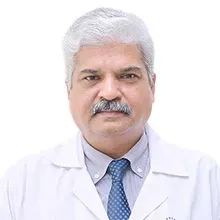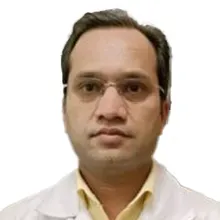Overview of Cervical Cancer Treatment in India
Cervical cancer begins in the cells of the cervix, which is the lower part of the uterus. In this condition, cells start dividing uncontrollably. The primary cause is a sexually transmitted infection and common symptoms include irregular bleeding, abnormal vaginal discharge, and lower back pain. Treatment options are based on the cancer's stage and may involve procedures such as Conization, Chemotherapy, Hysterectomy, Radiation therapy, and drug therapy.
The cost of cervical cancer treatment in India ranges from ₹ 3,59,000 to ₹ 4,59,000. The overall cost depends on the diagnosis, the facilities of the hospital, and the patient's health at the time of diagnosis. The cost can vary according to the need for several diagnostic and blood tests, the number of chemotherapy sessions, medications, and hospital stays. The cost can also vary according to the cancer stage, type, and complications.
Types of Cervical Cancer Treatment in India
Types of treatments for cervical cancer
Chemotherapy
The drugs that kill cancer cells anywhere in the body are either taken orally or injection to the veins. It may be used alone or with other treatment options like radiation therapy. It can also be used to avoid recurrent cervical cancer. Some of the drugs are:
- Cisplatin/ cisplatin plus-5.
- Carboplatin
- Paclitaxel (Taxol)
- Topotecan
Radiation Therapy
The high energy x-rays used to kill cancerous cell is often given with two ways:
External Beam Radiation Therapy: The procedure is very much like the x-ray examination but the dose of the x-rays is quite stronger. It is often used with chemotherapy.
Internal Beam Radiation Therapy (BRACHYTHERAPY): a radioactive material is placed in the cavity to kill cancer cells which is referred as intracavitary brachytherapy. It may be given as low dose for some days in the indoor department or can be given in high dose for months in an outpatient department in hospitals.
Immunotherapy
The drugs to enhance the body’s natural defense system against cancer cells are used in this treatment. It can be taken as oral medications and intravenous injections. Some of the drugs are:
Targeted Drug Therapy
These drugs may be given to block the nutrients to cancer cells and attack their environment in which they grow. They may be used to inhibit angiogenesis in cancer cells or attack as antibody drug conjugate (ADC). These drugs are:
- Tisotumab vedotin-tftv
- Bevacizumab
- Dostarlimab-gxly
Surgery
Some surgical procedures are used according to the patients’ health.
Cryosurgery: the cancer cells go through a procedure in which they freeze to death by placing the probe directly to the tumor.
Laser ablation: the beam of laser applied to the tumor to burn the cancer cells directly.
Conization: doctor removes the piece of cervix in a cone shaped to separate the tumor from the healthy normal cells.
Hysterectomy: the removal of the uterus either without its surrounding structures and lymph nodes or along with surrounding structures.
Trachelectomy: this procedure removes the part of vagina and cervix but spare the uterus for reproductive purposes.
Diagnosis & Cost of Cervical Cancer Treatment in India
Diagnosis for cervical cancer
Sterile Speculum Examination
The gynecologists usually examine the vulva, vagina and by speculum the internal structures like cervix and uterus to see any changes in these structures. Any abnormality is then noticed and reported.
Pap Test
Doctors take the samples from the cervix and then test for any abnormal cancer cells in the sample. This is done in clinical settings and laboratory centers.
Human Papillomavirus Testing
This is similar to a pap test and sample sent to the laboratory. There they examine for any infection or antigen of the HPV.
Colposcopy
The colposcope is a device used to magnify the cells of the cervix and vagina, just like a microscope. It gives a clear picture and magnifying view of the tissues of the vagina and the cervix to the doctor examining.
Biopsy
It is the removal of a portion of tissue for examination under a microscope. Other tests can give the idea that cancer may exist, but biopsy can make an obvious diagnosis.
X-ray
An intravenous urography is an x-ray that is used to view the inside of the cervix and vagina. It gives the picture of appearance of the structure and hence gives the idea if any abnormal mass is present.
MRI
An MRI uses magnetic fields to produce clear images of the body. MRI can be used to measure the size of the tumor. A special dye like contrast medium is used before the scan to clearly find the results.
Cost of Cervical Cancer Treatment in India
The cost of cervical cancer treatment in India ranges from ₹ 2,10,000 to ₹ 280,000. The cost can vary according to the complexity of each patient's disease and the requirement of combination treatment to treat aggressive types of cancers. some of the treatments and their costs are mentioned below:
| Cost of Cervical Cancer Treatment in India |
Min in INR |
Max in INR |
| Chemotherapy Per Session |
₹ 40,000 |
₹ 54,000 |
| Radiation therapy |
₹ 45,400 |
₹ 95,000 |
| Immunotherapy |
₹ 1,45,000 |
₹ 4,48,000 |
| Target drug therapy |
₹ 1,98,500 |
₹ 2,94,000 |
| Surgery (Hysterectomy) |
₹ 1,05,000 |
₹ 3,72,000 |
Cervical Cancer Treatment Cost in Different Cities of India
| Cost of Cervical Cancer Treatment in Cities of India |
Min in INR |
Max in INR |
| New Delhi |
₹ 1,75,000 |
₹ 2,76,000 |
| Gurgaon |
₹ 1,79,000 |
₹ 2,72,000 |
| Noida |
₹ 1,68,000 |
₹ 2,83,000 |
| Chennai |
₹ 1,84,000 |
₹ 2,60,000 |
| Mumbai |
₹ 1,83,322 |
₹ 2,76,000 |
| Bangalore |
₹ 1,75,000 |
₹ 2,68,000 |
| Kolkata |
₹ 1,68,000 |
₹ 2,55,000 |
Symptoms & Risk Factors of Cervical Cancer Treatment
Symptoms Associated with Cervical Cancer
- Bleeding other than menstruation.
- Bleeding after sexual activity
- Long time bleeding during menstruation
- Vaginal secretions
- Foul smell
- Groin and back pain
- Pain during sex
- Bleeding after menopause
Risk Factors for Cervical Cancer
Human Papillomavirus (HPV)
Mostly it happens in sexually active people and often go away easily. But in some cases, it develops the chances of cervical and prostate cancer. From all the types, HPV16 and HPV18 are the risks to cervical cancer. HPV vaccines can help prevent the virus.
Compromised Immunity
The patients taking drugs like steroids and immune therapy for other cancer treatments have less immunity than normal. It may be due to viral infection HIV (human immunodeficiency virus) which causes acquired immunodeficiency syndrome (AIDS).
Herpes
The sexually transmitted viral infections are all the major risk factors for cervical cancer and Herpes virus also causes cervical cancer in the majority of the population.
Oral contraceptives
Oral contraceptives are the drugs to control birth. It is associated with high prevalence of cervical cancer in women. It may be due to the hormonal imbalance it may cause or poor regimen of the pills but more research is required to confirm this association.
Diethylstilbestrol (DES)
This drug is usually given to the patients with high risk of miscarriage. The drugs are causing high risk to develop cervical and vaginal cancer in the later stages of life.
Socioeconomic factors
Low- and moderate-income countries are more prone to develop the cancer due to the inability of screening and healthy sexual activities. High income countries have less prevalence of cervical cancer due to regular screening procedures in their access.
Age
The younger people less than 20 years of age are less likely to develop cervical cancer. It is more prevalent in women aged 40-50 years. Usually after 40 years menopause occurs and chances of developing cervical cancer increases.
Smoking and alcohol consumption
Smoking doubles the chances of cervical cancer. So, smokers are more likely to develop cervical cancer than non-smokers. Also, alcohol consumption, usually 3-4 drinks per day, causes a high risk of cervical cancer in women.
Unsafe sexual intercourse
People who don’t use condoms and other barrier methods during sex are more likely to catch sexually transmitted diseases. However, the HPV can develop and ultimately can cause cervical cancer.
Top Doctors of Cervical Cancer Treatment in India
Empower your Health with the Expertise of Leading Medical Professionals.
Dr. Gursimran Dhaliwa
Department of Obstetrics & Gynaecology
Consultant
Book Appointment
Treatment Costs for Cervical Cancer
Be the change and be an opportunist in transforming healthcare.
Steps for Cervical Cancer Treatment in India
Guiding your Journey from Discovery to Treatment Planning and Beyond.
Discovery
Get a consultation to discover about your treatment
Pre-Treatment
Admission to the best hospital and all pre-treatment facilities
Post Treatment
Get post-treatment follow-up care with medicine fulfillment
Treatment Planning
Hassle-free treatment planning with package & cost estimations
in-treatment
world-class quality procedures and equipment for treatment


























